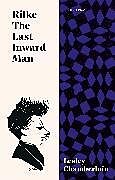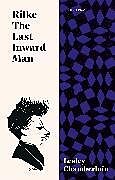Rilke: The Last Inward Man
Einband:
Fester Einband
EAN:
9781782277248
Genre:
Linguistics & Literature
Autor:
Chamberlain Lesley
Herausgeber:
Random House N.Y.
Erscheinungsdatum:
28.04.2022
Autorentext
Lesley Chamberlain is a British writer and critic who has written extensively on German and Russian literature and published three novels. Her books include The Philosophy Steamer: Lenin and the Exile of the Intelligentsia, The Secret Artist: A Close Reading of Sigmund Freud and Motherland: a Philosophical History of Russia. Nietzsche in Turin is also available from Pushkin Press.
Klappentext
An incisive and intimate account of the life and work of the great poet Rilke, exploring the rich interior world he created in his poetry
When Rilke died in 1926, his reputation as a great poet seemed secure. But as the tide of the critical avant-garde turned, he was increasingly dismissed as apolitical, as too inward.
In Rilke: The Last Inward Man, acclaimed critic Lesley Chamberlain uses this charge as the starting point from which to explore the expansiveness of the inner world Rilke created in his poetry.
Weaving together searching insights on Rilke's life, work and reception, Chamberlain casts Rilke's inwardness as a profound response to a world that seemed ever more lacking in spirituality.
In works of dazzling imagination and rich imagery, Rilke sought to restore spirit to Western materialism, encouraging not narrow introversion but a heightened awareness of how to live with the world as it is, of how to retain a sense of transcendence within a world of collapsed spiritual certainty.
Leseprobe
from the Introduction
In 1926, when he died aged only 51, Rainer Maria Rilke counted as a great poet. Ten years later the critical avant garde favoured the imagination of Kafka, a poet writing a new kind of prose; and Brecht, a poet who wanted to change the world. Brecht ended up transforming the lyric poem, and the very concept of theatre. Kafka’s parables became such useful political references that many who admired him would never know him as a writer. It was said that Rilke was not political.
Poetry modernized itself radically and became more social in the politically charged 1930s, in Germany and in England. But two or three decades earlier there had been an aesthetic revolution, of which Oscar Wilde and Henry James caught the outside edge. Rilke was at the centre.
Classical music offers a fabulous example of what was happening to art in Rilke’s Austria and Germany in the early twentieth century. Schoenberg’s atonal music seemed to express modern condition, the way the neo-Romantic tradition before him did not. The neo-Romantics were composers like late Brahms and the searingly emotive Hugo Wolff. They were the forerunners of the Second Viennese School of Schoenberg and others. Their emotionally laden and discordant harmonies pointed ways out of the nineteenth century. But they did not compel the abiding Western tradition to reinvent itself. That’s roughly where I think we should place Rilke too, between these two moments in music. His lyrics and his so-called ‘thing-poems’, his elegies and his sonnets were new and unique, and yet they could be absorbed into what went before; even centuries before. And so with hindsight, and even more political hindsight, Rilke counted as not modern enough.
But to call Rilke conservative and exclusively aesthetic-minded diverted attention precisely from what made him new. The world he addressed was losing its spirituality. His poetry toyed with whether language could recover the loss.
Rilke worked with a limited range of physical experiences. His life had a narrowly focus. But his poems grew into huge questions. Born in Prague and living in Munich, he travelled to Italy. In Rome and Florence he began to test his secular faith in the great humanist tradition. He went to Russia, spent a year in the north German countryside, and moved to Paris. Confined to Munich during the Great War he was only modestly peripatetic thereafter, and gratefully accepted a Swiss bolt-hole purchased in his name for his last four years. When he died in 1926 his poetry was still covering ground that preoccupied him as a young man.
What made him creative was how he responded to that limited series of environments. He relished nature and works of art everywhere, and lived among animals, birds and trees, under dark and light skies. The wind and the stars and the soil were strong presences, while people were scarce. He loved, and noticed, colours, cathedrals, Greek sculptures and children’s merry-go-rounds, and flowers. Two of his most famous short poems evoked the hydrangea and the rose, and, like Van Gogh, he was fascinated by once beautiful life in decline. He spent months of sponsored solitude in some of the minor family houses of a declining European aristocracy; German, Danish, Bohemian. Whether we read him in the original German, or whether we come to him as the English Rilke, or the French Rilke, of the Japanese Rilke, or read him in Braille, he is a great poet, for the music of his language, and for his preoccupations.
What made him great? I would say he was trying to find a new sensibility for the twentieth century, at a time when a certain style of philosophy had not yet made ‘the meaning of life’ a naive question. His poems concern our gender and sexuality, our sense of what we ought to be doing with our lives, the possibility of the existence of God, the charmed kinship with animals which brings us such happiness, the importance of childhood, the attraction of the physical objects we make and buy and choose to live among, the landscapes we respond to, the books we read and the paintings in whose company we live. There is no object under Rilke’s gaze that resists transformation into a feature of a marvellous universe that envelops us in a world that might otherwise leave us restless and afraid.
Human existential identity was a conundrum. Rilke searched not for a definition but for places and seasons that would allow him to speak of it. The search was not for a vantage-point but for a metaphor. So it is a marvellous experience to follow daily life with his eyes, through the park and along the street, and occasionally into a more exotic landscape. He can transform anything. He doesn’t need clichéd Romantic inspiration to enchant his readers. In his 10th Duino Elegy he lists the kinds of places humans frequent: ‘Stelle, Siedlung, Lager, Boden, Wohnort’. Lurking behind this Thesaurus-like list is the question: Where are we? Where do we dwell? And, perhaps, even, how do we flower and bear fruit before we too die? Ripeness is a preoccupation as much as decline.
How to translate that string of places varies. It’s ‘place and dwelling, camp and ground and home’ for Vita and Eddy Sackville-West, the very first translators of the Elegies; ‘place and settlement, foundation and soil and home’ for the outstanding contemporary translator Stephen Mitchell; ‘soil, place, village, storehouse, home’ for the eccentric but sometimes illuminating Rilke pilgrim William Gass. The point is that all kinds of places matter to us: our geographical location, the place we have settled with others, the place we have chosen to rest; where we were born; what is our present address. Add in landscapes: mountains, valleys, meadows, streams, the river Nile, the bridge at Ronda, an ancient volcano. And townscapes: marketplaces, post-offices. All these ‘locations’ bring out features of our human existence to help us speculate on what we are doing here, on this earth, in what Rilke called our Weltraum. Literally it’s the space our world occupies, though it’s also conventionally the universe. For me the right translation will sometimes be ‘space and time’.
By 1875, the year of his birth, Rilke was well aware of the pressures falling on an ideal…

Leider konnten wir für diesen Artikel keine Preise ermitteln ...
billigbuch.ch sucht jetzt für Sie die besten Angebote ...
Die aktuellen Verkaufspreise von 6 Onlineshops werden in Realtime abgefragt.
Sie können das gewünschte Produkt anschliessend direkt beim Anbieter Ihrer Wahl bestellen.
Loading...
Die aktuellen Verkaufspreise von 6 Onlineshops werden in Realtime abgefragt.
Sie können das gewünschte Produkt anschliessend direkt beim Anbieter Ihrer Wahl bestellen.
| # | Onlineshop | Preis CHF | Versand CHF | Total CHF | ||
|---|---|---|---|---|---|---|
| 1 | Seller | 0.00 | 0.00 | 0.00 |
